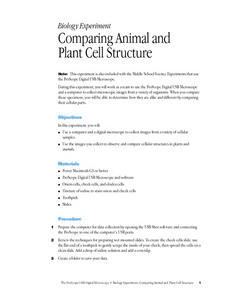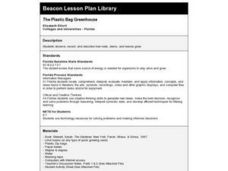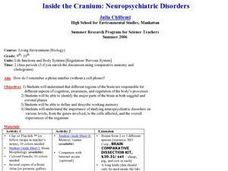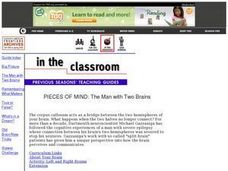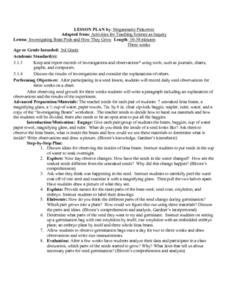Chicago Botanic Garden
Preparing for Project BudBurst
Male deer growing antlers to begin the breeding season is an example of a phenological event. First in a four-part series is an activity requiring individuals to collect phenological data on their campus. Classes discuss phenology, the...
Teach Engineering
Inside the DNA
Get your class to take a closer look at DNA. Pupils conduct research to determine the methods used by scientists to analyze the molecular structure of DNA. The class members investigate different types of molecular imaging along with gel...
Curated OER
Plant Parts
Students use "Kid Pix" to explore plants. For this science and technology lesson plan, students become familiar with plant parts and label them on a plant. Students tell the functions of each of the plant parts.
Curated OER
Comparing Animal and Plant Cell Structure
Students work as a team to use the ProScope Digital USB Microscope and a computer to collect microscopic images from a variety of organisms. When they compare these specimens, they are able to determine how they are alike and different...
Space Awareness
Valleys Deep and Mountains High
Sometimes the best view is from the farthest distance. Satellite imaging makes it possible to create altitude maps from far above the earth. A three-part activity has your young scientists play the role of the satellite and then use...
Teach Engineering
Cell Membrane Structure and Function
Teach your class how to get out of a cell — or break in. The third installment in a seven-part series introduces the class to cell membranes and their functions. The lesson plan includes information to present to the class,...
Berkeley Lab
Virtual Frog Dissection Kit
Fluffy is one of the most common names for a pet frog. Fluffy, the digitized frog in this dissection kit, opens up quite literally to allow scholars to see what's inside. The basic kit encourages pupils to click on various organs to see...
Curated OER
The Plastic Bag Greenhouse
Third graders observe plants and record their growth. They describe the parts of plants in detail including the roots, stems and leaves.
Curated OER
Inside the Cranium: Neuropsychiatric Disorders
Young scholars analyze different regions of the brain which are responsible for different aspects of cognition, awareness and regulating the body's process.
Curated OER
Systems
In this systems worksheet, students read a selection about systems in science and graphic organizer about the forest system. Finally, they answer 4 short answer questions.
Curated OER
Sense of Hearing
Students explore the sense of hearing. In this human biology lesson, students listen to the story Polar Bear, Polar Bear, What Do You Hear? and give examples of how they use their sense of hearing everyday. Students pass around plastic...
Curated OER
The Battle of the Guts
Students listen to story, The Magic School Bus: Inside Ralphie, take notes from story on how body fights germs, identify different functions of immune system, and use Kid Pix slide show to explain how body fights viruses and bacteria.
Curated OER
What's the Matter?
Students explore matter. In this matter and technology lesson, students locate examples of solids, liquids, and gases inside and outside the classroom, and record their findings in a graphic organizer. Students listen to the...
Curated OER
Function Junction
Students identify the internal and external components of computers, robots and fan. In this physics lesson, students draw a circuit diagram of their electronic components. They create a battery tester in the lab.
Curated OER
Left and Right Brains
Pupils research the part of the brain known as the corpus callosum. The part of the brain that connects the left and right brain, students investigate its functions and how data passes from one side to another.
Curated OER
Infectious Diseases
Eighth graders identify and explain how infectious diseases effect organ systems. Using an analogy with automobiles and body systems, they discover how one part influences the operation of the whole. Students write paragraphs about...
Curated OER
Land Use Issues
Students discover seeds are a source of life. They also label the parts of a seed and examine the conditions which are needed for the seed to start growing. They follow the life cycle of seeds.
National Nanotechnology Infrastructure Network
Lines on Paper - Laser Box
See what you cannot see by getting a little creative. An intriguing lesson has learners use lasers to explore X-ray diffraction. Given a box with unknown structures, they shine a laser through the box and interpret the results....
Chicago Botanic Garden
Preparing for Project BudBurst
Plants take cues from the environment—change in daylight hours and temperature—to complete their seasonal life cycles. Lesson four in the series of six has classes collect phenology data on plants. After taking initial observations,...
Cornell University
Atomic Bonding
Explore the connection of surface area to bonding within atoms. Learners complete lab investigations to model changing surface area with different sizes and concentrations of atoms. A flour fireball demonstration follows the labs to...
Polar Trec
Nature's Density Column
Nature provides density columns in the polar regions that provides food for many animals. Young scientists build their own density columns with water in order to answer analysis questions. Through a slideshow presentation, scholars...
Curated OER
Investigating Bean Pods and How They Grow
Third graders observe and create a record of seed growth over time. After planting a seed, 3rd graders record their observations of the seed's growth over a three week period. Upon conclusion of the experiment, they write a paragraph...
Curated OER
Biology - Virus Modeling
Students research one of the many types of viruses. They create a 3-D model of the virus they researched with graphics software.
Curated OER
Moving and Growing
Students explore the types of skeletons in various animals. In this skeletal systems lesson, students watch a video clip about skeletons, view a human skeleton, compare the skeletons of humans, chickens and fish, and learn about...



